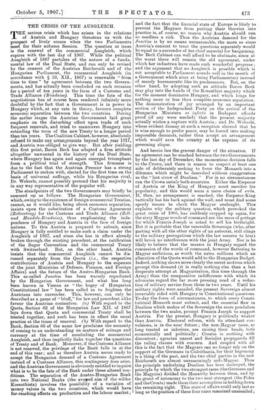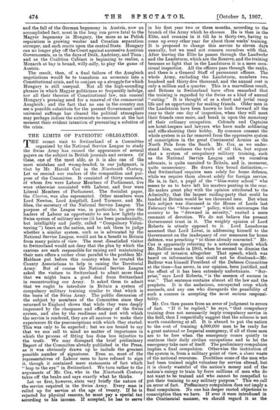THE CRISIS OF THE AUSGLEICH. T HE serious crisis which has
arisen in the relations of Austria and Hungary threatens us with the prospect of lively scenes when the two Parliaments meet for their autumn Session. The question at issue is the renewal of the commercial Ausgleich, which expires with the last day of 1907. While the political Ausgleich of 1867 partakes of the nature of a funda- mental law of the Dual State, and can only be revised by the consent of the Austrian Reichsrath and of the Hungarian Parliament, the commercial Ausgleich (in accordance with § 59, XII., 1867) is renewable " from time to time " by agreement between the two Govern- ments, and has actually been concluded on each occasion for a period of ten years in the form of a Customs and Trade Alliance (Bkndniss). This time the fate of the negotiations has of course been rendered infinitely more doubtful by the fact that a Government is in power in Hinigary which, at any rate in theory, favours complete economic separation between the two countries. During the earlier stages the Austrian Government laid great emphasis on the disturbing effect upon trade of such frequent renewals, and tried to manceuvre Hungary into extending the term of the new Treaty to a longer period than ten years. The Coalition Cabinet, however, absolutely refused to make any arrangements beyond the year 1917, and Austria was obliged to give way. But after yielding this first point, Baron Beck has adopted a firm attitude altogether unwonted in the history of the Dual State, where Hungary has again and again emerged triumphant from a political trial of strength. This firmness is due to the fact that the Austrian Premier has a strong Parliament to reckon with, elected for the first time on the basis of universal suffrage, while his Hungarian rival, Dr. Wekerle, cannot possibly pretend that his majority is in any way representative of the popular will.
The standpoints of the two Governments may briefly be summed up as follows. The Hungarian Government, which, owing to the existence of foreign commercial Treaties, cannot, as it would like, bring about economic separation, insists upon the substitution of a Customs Agreement (Zollvertrag) for the Customs and Trade Alliance (Zoll- und Handels-Biindniss), thus emphasising the inde- pendence of Hungary and Austria in the face of foreign nations. To this Austria is prepared to submit, since Hungary is fully entitled to make such a claim under the Ausgleich of 1867, and since she has in effect already broken through the existing precedent, at the ratification of the Sugar Convention and the, commercial Treaty with Switzerland. But, on the other hand, Austria insists that the commercial Ausgleich cannot be dis- cussed separately from the Quota (i.e., the respective contributions of Austria and Hungary to the expenses of the joint Ministries of Defence, Finance, and Foreign Affairs) and the future of the Austro-Hungarian Bank. This so-called Junctim has been warmly repudiated by the Hungarian Government, and what has long been known in Vienna as " the bogey of Hungarian Constitutional law " has been called in to frighten the Austrians into surrender. This, however, can only be described as a game of " bluff," for law and precedent alike favour the Austrian contention. (a) With regard to the Quota, Section 62 of the Hungarian Law XII. of 1867 liys down that Quota and commercial Treaty shall be treated together, and such has been in effect the usual practice at the times of renewal. (b) With regard to the Bank, Section 66 of the same law proclaims the necessity Of coming to an understanding on matters of coinage and currency at the time of concluding the commercial Ausgleich, and thus implicitly links together the questions of Treaty and of Bank. Moreover, if the Customs Alliance is not renewed, the privilege of the Bank falls in at the end of this year ; and as therefore Austria seems ready to accept the Hungarian demand of a Customs Agreement instead of a Customs Alliance, this contingency does arise, and the Austrian Government is obviously entitled to inquire what is to be the fate of the Bank under these altered con- ditions. The separation of the Austro-Hungarian Bank into two National Banks (the avogred aim of the wilder Rossuthists) involves the possibility of a variation of monoy values in the two countries, which would have far-reaching effects on production and the labour market ; and the fact that the financial state of Europe is likely to prevent the Magyars from putting their theories into practice is, of course, no reason why Austria should run so needless a risk. Thus the Austrian demand for the Junctim is by no means unreasonable, the more so since Austria's consent to treat the questions separately would be equal to a surrender of her chief material for bargaining. The Beck Cabinet can well afford to be obstinate, since at the worst there will remain the old agreement, under which her industries have made such wonderful progress ; and the argument that no Ausgleich is possible which is not acceptable to Parliament sounds well in the mouth of a Government which aims at being Parliamentary instead of merely bureaucratic like its predecessors. Rut, on the other hand, by adopting such an attitude Baron Beck may play into the hands of the Kossuthist majority which for the moment dominates Hungary, and which longs for nothing more or less than complete economic separation. The demonstration of joy arranged by an important section of the Independent Party on the arrival of the Hungarian Ministers re infecta in Budapest affords proof (if any were needed) that the present majority actually wishes a rupture with Austria ; and Dr. Wekerle, whose evident dismay at such a reception showed that he is wise enough to prefer peace, may be forced into making impossible demands, rather than accept an arrangement which would save the country at the expense of its governing clique.
And herein lies the gravest danger of the situation. If no agreement can be reached between the two Governments by the last day of December, the momentous decision falls to the Crown, and there is reason to suspect at least one side of deliberately seeking to force the Monarch into a dilemma which might be described without exaggeration as the " last straw of Dualism." For in no circumstances can the Crown satisfy both countries. Either the Emperor of Austria or the King of Hungary must sacrifice his popularity, and this would seem a mere choice of evils. If, then, no arrangement is reached, the Emperor-King tactically has his back against the wall, and must find some speedy means to check the Magyar onslaught. This explains why the military question, which provoked the great crisis of 1905, has suddenly cropped up again, for the sixty Magyar words of command are the mess of pottage for which Francis Joseph is asked to sell his birthright. But it is probable that the venerable Sovereign (who, after parting with all the other rights of an autocrat, still clings to the military prerogatives which the law assures to him) will brook no interference with the joint Army. Nor is he likely to believe that the masses in Hungary regard the concession of the words of command, however flattering to Magyar ambitions, as worth the extra millions which an alteration of the Quota would add to the Hungarian Budget. Indeed, nothing shows more clearly the secret motives which prompt this demand (it is really nothing else than a last desperate attempt at Magyarisation, this time through the Army) than the comparative indifference with which its advocates regard the far more pressing need of a reduc- tion of military service from three to two years. Until his military rights were assailed, the present Sovereign almost invariably sided with Hungary in Constitutional questions. To-day the force of circumstances, to which every Consti- tutional Monarch must submit, and the essential flaw in Dualism which makes of the Sovereign the mere pendulum between the two scales, prompt Francis Joseph to support Austria. For the present, Hungary is politically weaker than Austria. Electoral reform, with its attendant con- vulsions, is in the near future ; the non-Magyar races, so long treated as inferiors, are raising their heads, both economically and politically ; Croatia is seething with discontent ; agrarian unrest and Socialist propaganda fill the ruling classes with concern. And coupled with all this is the fact that the Magyars can no longer rely on the support of the Germans in Cisleithania, for their hegemony i is a thing of the past, and the two chief parties in the new Reichsrath are almost unreasoningly anti-Magyar. Thus the principle underlying Dualism has been destroyed, the principle by which the two strongest races (the Germans and the Magyars) divided the Monarchy between them, and by the grant of autonomy to the two next strongest (the Poles and the Croats) made them their accomplices in holding down the remaining eight. This state of affairs could only last so long as the position of these four races remained unassailed ; and the fall of the German hegemony in Austria, now an accomplished fact, must in the long run prove fatal to the Magyar hegemony in Hungary, the more so as Polish separatism is growing weaker and Croatian separatism stronger, and each reacts upon the central State. Hungary can no longer play off the Court against successive Austrian Governments, as in the days of Desk, Andrassy, and Tisza ; and as the Coalition Cabinet is beginning to realise, a Monarch at bay is bound, willy-nilly, to play the game of Austria.
The result, then, of a final failure of the Ausgleich negotiations would be to transform an economic into a Constitutional crisis, and to conjure up a struggle for which Hungary is still unequal. Not all the high-sounding phrases in which Magyar politicians so frequently indulge, nor all their theories of Constitutional law, can conceal Hungary's pressing need for a renewal of the commercial Ausgleich ; and the fact that no one in the country can see a possible substitute for the present Government until universal suffrage has cleared the political atmosphere may perhaps induce the extremists to renounce at the last moment their evident intention of preventing a solution of the crisis.































































 Previous page
Previous page